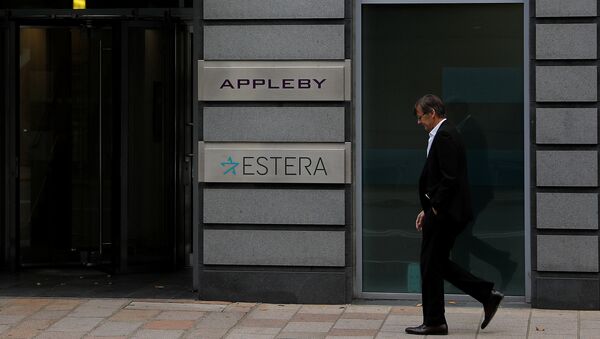The publication of the Paradise Papers, a collection of 13.4 million documents most of which originated from Bermuda-based law firm Appleby, has once again drawn attention to the use of offshore tax havens by rich and powerful clients.
The files include emails, bank statements, court documents and client records dating from 1950 to 2016. They were given to the German newspaper Sueddeutsche Zeitung, which subsequently shared it with the International Consortium of Investigative Journalists. The leak is even bigger than the Panama Papers, a collection of 11.5 million documents stolen from the Panama-based law firm Mossack Fonseca and published in 2016.
Appleby has stressed that the company has done nothing unlawful and argues that the term "leak" is inaccurate, since the information reached the public domain because of a "serious criminal act" in which its "systems were accessed by an intruder who deployed the tactics of a professional hacker."
Investigative journalist David Marchant, owner and editor of OffshoreAlert.com, told Radio Sputnik that offshore financial services are a lucrative way for for small island economies such as Bermuda, the British Virgin Islands and Seychelles to increase their wealth.
Sputnik: Please give us an overview of offshore jurisdictions in general. What's their purpose, who established them, how long have they been operating and what are the differences between the different places that are doing this?
David Marchant: Offshore jurisdictions are typically small countries with limited resources, a limited workforce and in order to improve the lot of their residents, they have had to be creative. They have developed business-friendly laws to attract foreign capital and that is their way of improving the lifestyles of the residents. Offshore centers, particularly in the Caribbean, typically have two pillars of their economies. One is tourism; these islands tend to be beautiful, warm, very pleasant places to go and relax so they receive foreign currency that way, and [the second is that] they have introduced laws to attract foreign investment.
Sputnik: What would be a standard net worth to be a client of this company, if you're say an individual?
David Marchant: Poor people do not go offshore. It makes no sense if you're earning $50,000 a year to spend $150,000 creating offshore structures. To do things legally offshore is very expensive, these attorneys, accountants, they bill several hundred dollars per hour. So to do it legally, to go to an offshore jurisdiction and get the best advice, to make it cost-effective you need millions of dollars otherwise it doesn't make any sense.
Sputnik: What's the big deal? Almost every single day, you hear more and more stories about offshores, for example the Panama Papers or the Paradise Papers. So, people hide their money from authorities, they spend a lot of money, more than regular folks will earn over their entire lifetime, to move cash over to another country so they don't have to pay tax. This is nothing new, or is there more to these papers?
David Marchant: For me, the leaks are not revealing anything that I didn't know already. What they have done, in my opinion, is just provide specific details about things we knew were happening anyway and this, of course, is embarrassing. Whether you are conducting business in New York, London, Caymen, Bermuda or the British Virgin Islands, you typically want to keep those business dealings as private as possible unless you're involved with a public company and there are disclosure requirements.
I deal a lot with law firms, particularly big law firms and you're always going to have a rogue employee or two who's cutting a few corners, trying to get ahead, doing things that he or she shouldn't be doing. So if any law firms' client database was leaked, I would expect there to be X percent of overt illegality that wouldn't necessarily reflect on the company as a whole. I've been surprised that I have not seen or read cases of overt illegality from this leak. That to me is surprising and if I were Appleby I would be playing that up and saying, "This is embarrassing, but all it has shown is we are a really good law firm that's really good at legally setting up structures so that our clients can save in some cases millions or tens of millions of dollars in financial obligations every single year."
Sputnik: So there probably won't be another prime minister of Iceland resigning over this?
David Marchant: I don't know, but you make a good point because the first leak, the Panama Papers, was of Mossack Fonseca, the second leak was of Appleby. Appleby is a significantly more credible law firm than Mossack Fonseca. I would expect Mossack Fonseca to have a plethora of sleazy clients. Panama is a sleazy jurisdiction. Appleby is a credible law firm operating in credible jurisdictions, the Cayman Islands is a first-class financial center, as is Bermuda, as are other centers that Appleby operates in including those in the Channel Islands. I would expect Appleby to have bone fide clients and I think this has proven to be the case.
There is a hierarchy in the offshore world, it's a myth that all offshore centers are the same, they're not, just like major countries are substantially different. The US is materially different to Russia, for example. Bermuda and the Cayman Islands are substantially different to St Vincent and the Grenadines or the Seychelles or Mauritius. There is a hierarchy and Appleby is at the top of that hierarchy. They operate at the top of that hierarchy. Mossack Fonseca operates at the bottom of that hierarchy.



